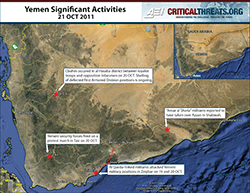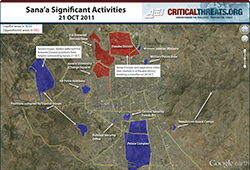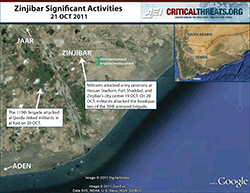 |
The pending UN Security Council resolution on Yemen’s political crisis is unlikely to pacify armed opposition groups in the country. In Yemen’s south, al Qaeda-linked militants continue to withstand a Yemeni military offensive in Abyan and are also operating openly in parts of Shabwah governorate.
Shelling and clashes occurred in Sana’a. Fighting occurred in al Hasaba district in north Sana’a between loyalist troops and opposition tribesmen. At least three people were killed in heavy exchanges of fire. A ceasefire had been in place. There are reports that loyalist troops have continually shelled positions of the defected First Armored Division in Sana’a.
 |
Violence flared in the central city of Taiz Thursday. Yemeni security forces fired tear gas and ammunition at protesters marching near Cairo Castle. Ten people were injured. Social media reports indicate that protesters turned out in force to celebrate the downfall of Libyan dictator Muammar al Qadhafi.
The Yemeni military continues to fight al Qaeda-linked militants in Zinjibar, the capital of Abyan governorate. A military source reported that the army sustained losses following an attack by Ansar al Sharia militants Wednesday. The 25th mechanized brigade and the governor’s house fell under siege. The militants had attacked army positions at Hassan Stadium, Fort Shaddad, and in the city center. A subsequent attack by militants on the headquarters of the 39th armored brigade forced army units to retreat from Zinjibar. The 119th brigade attacked the militants in al Kod on Thursday.
 |
A Yemeni official reported that Azzan in Shabwah governorate has been taken over by Ansar al Sharia (Supporters of Islamic Law). Residents are reportedly fleeing the areas as the al Qaeda-linked militants have taken over the city. Airstrikes targeted al Qaeda in the Arabian Peninsula (AQAP) militants in Azzan on October 14
The UN Security Council will vote on a resolution on Yemen today. The British draft resolution calls for the immediate signing of an agreement similar to the one proposed by the Gulf Cooperation Council (GCC). President Ali Abdullah Saleh called for guarantees to implementing the GCC agreement before he would sign it. A U.S. State Department spokesman called for Saleh to sign the GCC agreement, saying the U.S. does not believe “any further guarantees are necessary.”
The ongoing political crisis in the capital has placed the Yemeni state at risk of a broader armed conflict. Further, the Yemeni state has been undergoing fragmentation. Al Qaeda has seized control of territory in south Yemen and the current situation has increased the organization’s operating space in the country.
